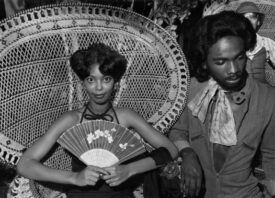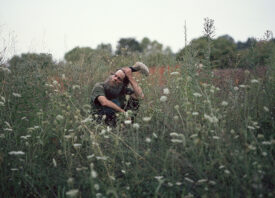Search this site
‘Left Behind’: Photos Document Life for the Elderly and Very Young in China’s Rural Communities
Zhu Huaxiang sits in the family’s front yard while her young grandson, Huang Chaoshuai, squirms in her lap.
The Huang children stand in the light of the doorway. Their home is not typically lit by electric light, so much of it remains dark when the doors are closed, even in the middle of the day.
What does it mean to be left behind? This is the question that American photographer Clary Estes began with in her latest project out of China. The largest internal migration in human history has seen nearly 160 million able-bodied Chinese move from the countryside to the booming economies of the east coast since 1978. Estes’ Left Behind project documents this historical event from the other side of the coin, from the perspective of the elderly and very young in China’s rural communities who remained behind.
Estes photographed the day-to-day life of the Huang family, a family living in Yingpanxu, a rural village in the verdant mountains of Jiangxi province. She met them during her time teaching a month-long photojournalism workshop. While out shooting in the countryside with her students they came upon the mother of the Huang clan tending to her field and struck up a conversation. Estes returned a few times to shoot the family after that. “Then suddenly the patriarch Huang Jingming died. This got me very close with the family and I shot the wake and funeral. I continued coming back throughout the year to shoot them and their story,” she says.
Estes captured intimate and sometimes painful moments during her time with the Huangs. A widow weeping during a funeral. A mother in pain following an emergency C-section. A young daughter crying in a bout of frustration. These are images that could only be taken by someone whom this family trusted and was okay with letting in to some of their most vulnerable experiences. Estes’ photographs reveal in haunting clarity what it means to be left behind.

Huang Junyan lies with her mother, Li Xiaowei. Her mother has been working too hard cutting wood in the mountains, and the effort is taking a toll on her pregnant body. With little knowledge of the proper care for pregnant women, Li Xiaowei is doing too much physical labor for her condition.

The funeral procession walks up the hill to the burial site. The family wears ceremonial headdresses to show they are in mourning, and wreaths for the dead are carried up the mountain and placed at the burial site.

Zhu Huaxiang cries outside of the family home as friends and relatives try to move her inside and away from the funeral guests.

Firecrackers are common in funeral ceremonies. They can be heard all over the valley of YingPanXu. They are used to celebrate as well as to mourn.

The Huang family’s grandmother, Zhu Huaxiang, picks dinner from the Huang family garden.

Huang Junyan studys in the local school. Her family commonly talks about how unintelligent Huang Junyan is and how she should work harder.
All images © Clary Estes





